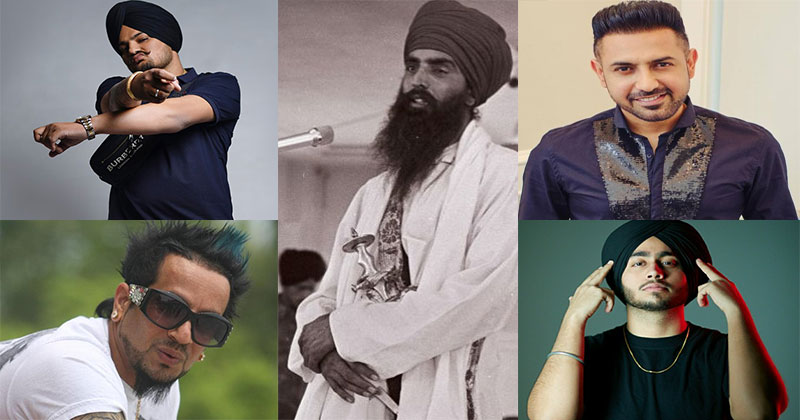A
Aditi Joshi
Guest
Yes you read it right! Knowingly or unknowingly you might be a Khalistani supporter or funding their efforts! Shocking isn’t it!
As we all know, music has, since ages, been a powerful medium through which protests have been not only created but also taken forward. The poems or songs sung during the Indian Freedom Struggle conveyed a strong political message and were aimed at dismantling oppressive rule. Songs were a medium for India’s freedom fighters to instill social consciousness in the minds of common Indians, who had probably accepted foreign rule as their fate.
In the collective memory of India’s fight for independence, the idea of non-violence, or “Ahinsa,” is often celebrated. Songs like “De di hame azadi bina khadg bina dhal” and “Sabarmati ke sant tune kar diya kamaal” have reinforced this narrative. However, it’s crucial to recognize that music can have multiple interpretations, and its influence is not limited to a single perspective.

PC Organiser
Today, there is a growing concern about the resurgence of Khalistan sentiments, particularly in Punjab. The issue is complex and has deep-rooted historical and sociopolitical factors. Over the past decade, there has been a revival of Khalistani propaganda through well-organized networks in countries like Canada, the UK, the US, Germany, and Australia. This resurgence has not only manifested in political activism but also in the music industry.
One alarming aspect of the Khalistan movement is the use of music to spread its ideology. Several Punjabi singers have gained popularity by releasing anti-India and pro-Khalistan songs with secessionist undertones.
Examples of such songs include “Panjab” by Sidhu Moosewala, “KAALI” by Ak47 Wale, and “Khalistan: The Solution” by Sophia Jamil. These songs not only promote violence but also disseminate false narratives about Sikh persecution and oppression in India.
The reach of these pro-Khalistan songs is amplified through social media platforms like YouTube. Many of these songs have garnered millions of views before being taken down for promoting violence. The popularity of such songs on these platforms highlights the need for stricter content moderation and regulations.

PC India Posts English
A recent Instagram post by a popular Punjabi singer, Shubh, residing in Canada ignited a fresh debate. The post featured a distorted map of India, omitting Jammu and Kashmir and the North-East region while including Punjab, Haryana, and Himachal Pradesh. Such actions by prominent Punjabi celebrities raise concerns about their support for Khalistan and their influence on impressionable minds.
In the context of the Khalistan movement, music has been used to promote secessionist ideologies and glorify violence. It is essential for authorities to address the resurgence of Khalistan sentiments. They need to be closely monitored.
What is worse is that with each stream and share, you end up supporting their terror
The post Your Hard Earned Money Is Funding Khalistanis appeared first on The Jaipur Dialogues.
Continue reading...
As we all know, music has, since ages, been a powerful medium through which protests have been not only created but also taken forward. The poems or songs sung during the Indian Freedom Struggle conveyed a strong political message and were aimed at dismantling oppressive rule. Songs were a medium for India’s freedom fighters to instill social consciousness in the minds of common Indians, who had probably accepted foreign rule as their fate.
The Influence of Music on India’s Struggles
In the collective memory of India’s fight for independence, the idea of non-violence, or “Ahinsa,” is often celebrated. Songs like “De di hame azadi bina khadg bina dhal” and “Sabarmati ke sant tune kar diya kamaal” have reinforced this narrative. However, it’s crucial to recognize that music can have multiple interpretations, and its influence is not limited to a single perspective.
The Resurgence of Khalistan and Its Musical Connection

PC Organiser
Today, there is a growing concern about the resurgence of Khalistan sentiments, particularly in Punjab. The issue is complex and has deep-rooted historical and sociopolitical factors. Over the past decade, there has been a revival of Khalistani propaganda through well-organized networks in countries like Canada, the UK, the US, Germany, and Australia. This resurgence has not only manifested in political activism but also in the music industry.
Toxic Music Promoting Khalistan
One alarming aspect of the Khalistan movement is the use of music to spread its ideology. Several Punjabi singers have gained popularity by releasing anti-India and pro-Khalistan songs with secessionist undertones.
These songs often glorify figures like Jarnail Singh Bhindrawale and advocate for violence as a means to achieve Khalistan.
Examples of such songs include “Panjab” by Sidhu Moosewala, “KAALI” by Ak47 Wale, and “Khalistan: The Solution” by Sophia Jamil. These songs not only promote violence but also disseminate false narratives about Sikh persecution and oppression in India.
The Role of Social Media and YouTube
The reach of these pro-Khalistan songs is amplified through social media platforms like YouTube. Many of these songs have garnered millions of views before being taken down for promoting violence. The popularity of such songs on these platforms highlights the need for stricter content moderation and regulations.
The Recent Controversy

PC India Posts English
A recent Instagram post by a popular Punjabi singer, Shubh, residing in Canada ignited a fresh debate. The post featured a distorted map of India, omitting Jammu and Kashmir and the North-East region while including Punjab, Haryana, and Himachal Pradesh. Such actions by prominent Punjabi celebrities raise concerns about their support for Khalistan and their influence on impressionable minds.
In the context of the Khalistan movement, music has been used to promote secessionist ideologies and glorify violence. It is essential for authorities to address the resurgence of Khalistan sentiments. They need to be closely monitored.
What is worse is that with each stream and share, you end up supporting their terror
The post Your Hard Earned Money Is Funding Khalistanis appeared first on The Jaipur Dialogues.
Continue reading...
